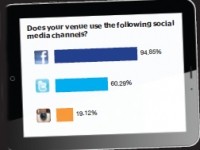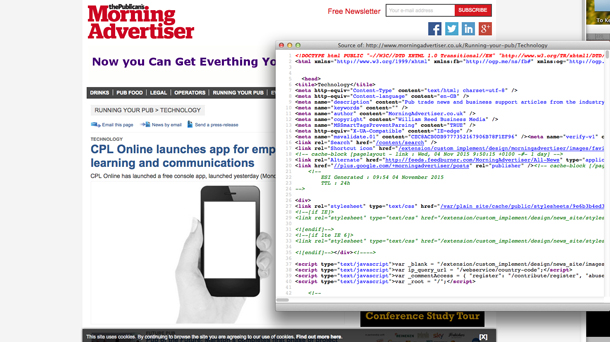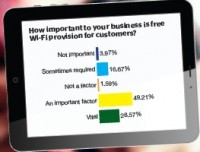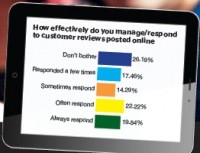Sponsored content
Digital trends: Are you plugged-in to customers needs?
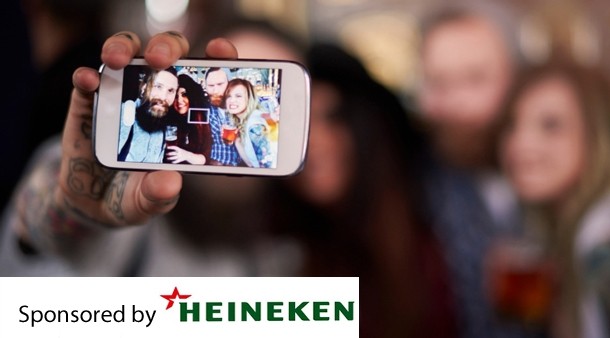
The digital world is a fast evolving place for licensees and the hospitality industry in general. As soon as you perfected your website and email marketing, along came social platforms such as Facebook and Twitter. Then you hear Instagram is the next big thing. And as for those customer review sites like TripAdvisor… it can all be very daunting in 2015.
But the Publican’s Morning Advertiser — in association with Heineken — has set out to ensure you are clued up with what you need to know about your customers’ requirements.
We surveyed the entire industry to find out what licensees believed was required to have a successful digital strategy, and the results were surprising.
Social platforms
The first intriguing finding from our survey is that only 13.89% of licensees think links to Facebook and Twitter pages should be on their website. This is an unexpected response and reveals publicans are missing a trick.
Consumers are always quick to use Facebook pages or Twitter handles to comment on service, provide feedback and offer engagement with your establishment.
Imagine if someone with a few hundred followers on Facebook or Twitter — most of them social groups and work colleagues from your catchment area — posted on your page?
That’s instantly going to market your pub to hundreds of possible customers’ news feeds. Now imagine if that is someone with thousands of followers, and you can see the importance of inter-connectivity between social accounts and other digital platforms.
DIY SEO
Licensees are right to place an emphasis on search engine optimisation (SEO) with a third stating this is important.
It must be said that this can be bread-and-butter stuff for the licensee, and doesn’t require big expenditure with the potential to be implemented internally. Any good web design — third party or otherwise — should ensure content is correctly placed to ensure you are top of searches.
If you are in doubt, then it may be worth getting a third-party to check over your site.
But you can do the check on SEO as well by taking a look at the source code, which is simple to do. Right-click on your mouse and click ‘view page source’. This will bring up a collection of text, including blocks with the word ‘meta’. You want to check the ‘title’ code and those with ‘meta’ (see the screen grab)
If these blocks are either unfilled or incorrectly marked up, then they will need to be chang-ed. A bad example may be text like ‘the Sportsman is a pub’, when what you really want it to say is ‘the Sportsman is a gastropub (insert pubco) in (insert location) specialising in fish, craft beer and new world wines’.
Design
Interestingly, two-thirds of licensees are satisfied with their website design, with some 10% describing them as ‘outstanding’.
Looking through the entrants to our survey, it must be said that there were some outstanding examples. But it is equally true that the design was too often based on viewing through a desktop computer with little thought to performance on a mobile device.
This is crucial. We are looking at entering an entirely mobile-based audience within the next decade as people migrate to smartphones for both e-commerce and other content. Make sure your site is mobile optimised and any emails you send out are mobile-responsive too. If users find it a hassle to view your webpages, the chances are they will look elsewhere to book a table or find out more about your establishment.
All you need to do is check how the site appears on your phone — if the size adjusts to your screen and is readable without zooming in, then you know it is responsive. If not, it might be worth some investment from a third party.
When quizzed on what social media channels are used by pubs, Instagram came out bottom with only 19.12% using it. And in another revealing question, when asked what support licensees would most like on social media, only 20% said they wanted help on Instagram, but 60% said they would like help on Facebook.
Although the importance of Facebook should never be taken for granted, the statistics on Instagram is definitely an area for massive improvement for licensees.
Last month, Instagram overtook Twitter — which 60% of pub operators said they used — as the second biggest social site after Facebook. It now has more than 400 million active monthly users, compared to Twitter, which has peaked somewhat at 320 million. Facebook is in a different stratosphere to all other social networks with a staggering 1.44 billion monthly users.
Instagram is easy to set up and is a great way to interact with customers, especially in food-led establishments.
You don’t have to worry so much about what to say on Instagram either — it’s all about the pictures — so it’s a much easier marketing strategy than Facebook or Twitter.
Simply post shots of plates, beer fonts, back bar and weird spirit bottles (the Kah Tequila skull bottle, for example) to gain attention on-line — and post pictures of events such as Halloween and Christmas decorations when they are a buzzing social trend.
Also, while you’re at it, you might as well set up a Pinterest page. Customers love to share interior shots of pubs on Pinterest, especially if you have an eclectic selection of furniture or interesting design elements, such as libraries and pinball machines.
Resource
Despite all the challenges of running these social channels, more than 75% of licensees are convinced they have either some or enough time to run them. Only 18% said they didn’t have any time to run social media.
This is an interesting response, as it hints at the issue above around not seeing the full potential of platforms such as Instagram.
Why, when publicans claim to have enough time, do so few pubs have Facebook and other social media profiles? Again, it may well come down to not believing in or understanding the value of the platform, and what it can offer customers.
It also raises another important question: who runs the social media account? The licensee or a general manager or a young member of staff? Many licensees may opt for a younger employee to look after social media because ‘they get it’ as a Millennial.
But is this the best person to send out important marketing messages and customer engagement within your business? Would you send a junior member of staff to deal with a customer complaint within the venue or a general manager? Again, these are crucial issues around social media and the digital world that have to be thought about before creating profiles.
Wi-Fi
It was encouraging to see that the vast majority of licensees, some 80%, believe that Wi-Fi is an important factor for their business, and only a very small amount, a mere 1% said it was not a factor for them.
But, concerningly, nearly 20% of licensees said it was either not im-portant for their business or only sometimes required.
This may be due to the ‘rural factor’ — ie, pubs in areas where the actual infrastructure to even be able to offer Wi-Fi is very limited. If this is the case, it illustrates how important it is for the Government to expand the network and assist rural businesses such as pubs with Wi-Fi access.
Customer review sites
It came as no surprise to discover that when licensees were quizzed on TripAdvisor and customer review sites, a mixed picture was presented.
When asked: ‘how do you respond to reviews posted online?’, it was an even 20% split across the five poss-ible choices, illustrating that there is no ‘industry standard’ for how to react. As many licensees ‘don’t bother’ as ‘always respond’ or ‘sometimes respond’.
This clearly shows the need for some industry-wide structure on how to respond to reviews, and for guidance to be given to licensees.
